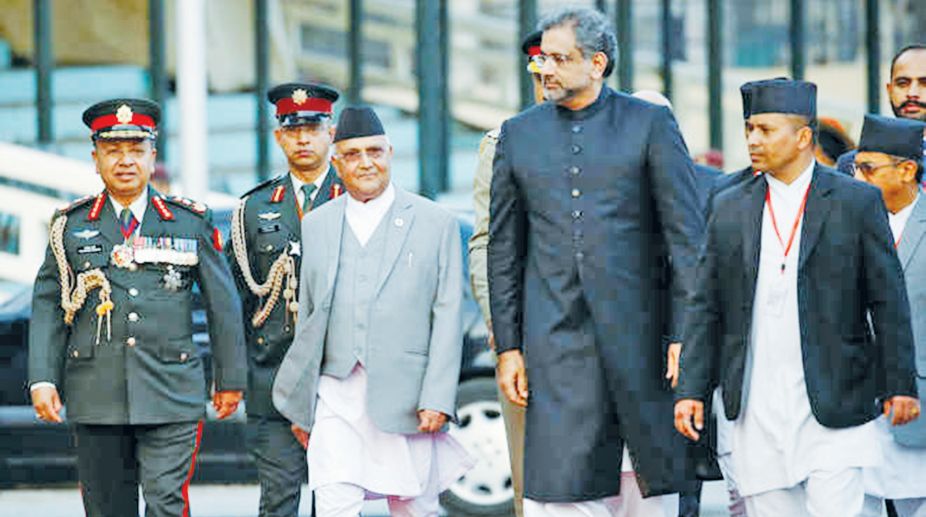Congress committing dacoity on rights of OBCs, SCs, STs: PM
“Wherever it (Congress) can do it, it will try to loot the claims of the SCs, STs and OBCs and give them to others,” said Modi.

Nepal’s Prime Minister KP Sharma Oli and Pakistani Prime Minister Shahid Khaqan Abbasi.
On March 5, when Nepal’s Prime Minister KP Sharma Oli welcomed Pakistani Prime Minister Shahid Khaqan Abbasi as his first foreign guest after assuming office, it sent dubious signals as to where his foreign policy choices were driven.
It is difficult to say if it was a result of the failure of South Block’s foreign policy or if Oli wanted to give a distinct message to India that he was continuing his desire to build a more intimate relationship with China. But this had been coming.
What was more striking was Oli’s handling of complex regional dynamics. Not only has the visit sent shockwaves within diplomatic circles, or presumably riled the Indian establishment, it poses a precarious path for Nepal in maintaining its non-aligned status besides raising serious doubts over Oli’s long-term ability to deal with geopolitical sensitivities.
Advertisement
And if foreign hands did coerce him into playing the Pakistan card against India, maybe it is time for Oli to re-think a more balanced, safe-sided approach to surrounding developments. Only then will Nepal be able to maximize its priorities in terms of regional stability, security matters and economic gains.
Oli, during his first stint as prime minister in 2016, signed several deals with China to counter an economic blockade imposed by India on Nepal. These deals opened new avenues for regional connectivity and cooperation, and ended India’s monopoly in offering trade transit and petroleum products to Nepal.
More so, it allowed China to gain a strong foothold in Nepal’s internal affairs. Domestically, Oli was perceived as a nationalist leader. Ever since, Oli and China have shared close ties.
The left alliance between the UML and the Maoist Centre bagged an overwhelming majority in the federal elections last November. Soon after the results were out, Oli paid a surprise visit to Rasuwagadhi on the border with China. It signalled his close affinity with the northern neighbour.
The prime minister’s home district of Jhapa is the biggest beneficiary of the wave of Chinese foreign direct investment in the country. Jhapa is touted to be one of the first districts to witness investment under China’s Belt and Road Initiative (BRI).
China is on course to build a Nepalese Rs 300 billion industrial park and the world’s largest Buddha statue to promote cultural and religious tourism in Jhapa. The UML leader’s relationship with China has worked wonders for him.
But shouldn’t we foresee potential costs? Handling foreign policy and conducting diplomatic initiatives for a country situated between two rising world powers can be tricky.
And when both superpowers are jostling for regional supremacy, Nepal cannot afford to be dragged into strategic competition or disputes between its regional partners.
This is presumably where Oli has played his cards rather immaturely. Abbasi’s visit was the first by a Pakistani prime minister to Nepal in almost 24 years.
The visit comes against a backdrop of changing dynamics of South Asia’s geopolitics. When Narendra Modi became prime minister of India, he emphasised a neighbourhood first policy.
But down the line, India has slowly begun to lose its sway, and Beijing seems to be taking up the role. Pakistan, Bangladesh, Maldives, Sri Lanka and Afghanistan have, over the years, shared close ties with China.
Pakistan sees China as a strategic partner to gain leverage in dealing with India. The China Pakistan Economic Corridor under the BRI envisages huge infrastructure development in Pakistan, much to the dislike of New Delhi.
China considers this idea to be a tactical advantage in containing India. It now believes that having Nepal in its grasp can have similar weightage. India, on the other hand, indicated a slightly softer line towards Nepal when it sent its Minister of External Affairs Sushma Swaraj to Kathmandu to congratulate Oli on his election victory.
However, interests remain, and concerns are intact. Many believe that Modi is again trying to mount a charm offensive in the region keeping in mind the Indian elections slated for next year.
We will not be able to figure out if there has been any tectonic shift in India’s policy towards Nepal until after the polls. Reports of India signalling to extend the tenure of the Eminent Persons Group also point to a more defensive approach.
Tensions between India and Pakistan are as high as ever, and it would be misleading to ask if Nepal could possibly play the role of mediator. The fact is that these two countries cannot stand each other’s existence.
India will always see Pakistan as a weaker state. Pakistan will do anything to be seen on the same level. No wonder Kashmir is known as the theatre of the New Cold War.
To put things in perspective, there has been a great number of ceasefire violations and cross-border infiltration across the Line of Control after India’s surgical strikes against Pakistan in 2016.
India, despite the wobbly state-to-state relations, will always be an extremely important neighbour to Nepal. Considering the open border, the deeply rooted cultural and religious ties, tightly knit people-to-people relations and the fact that it is our largest trading partner, Nepal cannot afford to undermine India’s importance.
If Oli sticks to playing one neighbour off against another with the hope of gaining leverage in dealings, as he suggested in an interview with the South China Morning Post recently, Nepal will continue to be mired in foreign meddling for a strategic regional hold. It’s repercussions in terms of security, as well as domestic and regional politics, could be detrimental.
The Kathmandu Post/ANN.
Advertisement